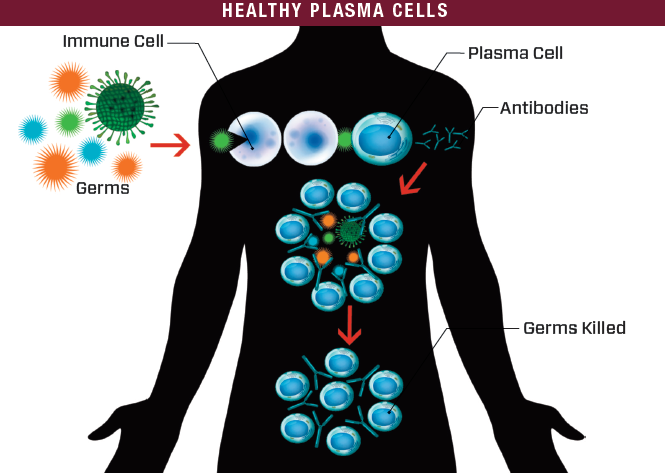Multiple myeloma is the second most common type of blood cancer, after non-Hodgkin Lymphoma. It occurs when plasma cells — a specific type of white blood cell — multiply out of control.
Plasma cells are part of your immune system. When they are normal, they help you fight infection. Here’s how: When germs enter your body, special immune cells “take a bite” from them, and with the help of other immune cells, present the pieces to the plasma cells to help them identify the enemy. The plasma cells then multiply into an army and produce antibodies to kill the germs. The antibodies are custom-made to attack those germs specifically, and they fit together like a key and a lock. (Plasma cells respond to vaccines and immunizations the same way — by making the antibodies that protect you against diseases such as the flu, measles and polio.)
As soon as the infection is gone, the plasma cells stop multiplying. Some of them go back into the bone marrow and stay there in case the germs return and they are needed again.
What are myeloma cells?
Plasma cells that become abnormal are called myeloma cells. They do not stop multiplying, and they produce antibodies that are not targeted to specific germs, so they are useless in fighting infection.
The antibodies produced by myeloma cells are called monoclonal proteins (M-proteins), and they can be measured in the blood and urine — which is why blood and urine tests are used in diagnosing multiple myeloma. If only parts of the antibodies are produced, they are called light or heavy chains.
Effects on bones
Different types of cells are responsible for bone renewal. In healthy people, osteoclasts break bone down, while osteoblasts build new bone. In people with multiple myeloma, over time the myeloma cells collect mostly in the bone marrow, putting the osteoclasts into overdrive and causing bones to weaken.
When plasma cells collect in high numbers and in multiple locations in your bones, the disease is called multiple myeloma. At this stage, bone damage leads to easily broken bones, or the over-activated osteoclasts cause the bone to release too much calcium into the blood.

